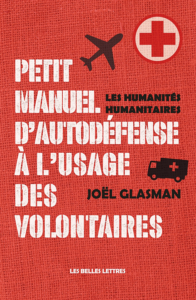La Haine qu’il faut [Necessary Hate]
Paul Salvanès
Published by Éditions du Toucan, 2018
(published in French)
It is true that things do not get off to a good start. First, there is no avoiding that classic of the genre – the inevitable romance between the aid worker and the photographer. Luckily the idyll quickly sours, proof that it served little purpose. Next we are infuriated by the publisher’s failure to spot typos and awkward turns of phrase, demonstrating a lack of respect for his author’s work: Paul Salvanès is a writer with style but one who knows how not to overplay it. He deserved a better proofreader. Finally – and this was perhaps the biggest problem of all –, Salvanès had undertaken to write in a genre that is very much more complex than it seems: however romantic it may be, the humanitarian sector rarely produces good novels. The same is true of all those themes, ranging from war, to sport and politics, that seem a priori to be endowed with a natural resilience, but which in inexpert hands and by dint of unimaginative and crass use of clichés at every turn, fail to hit the mark. Yet in his first novel, Paul Salvanès has managed very well, deftly overcoming this last major hurdle and relegating our initial two reservations to the level of the peccadillo.
There is nothing original about the storyline, and this is a good thing because it means the author can bring it down to the human level, as close as possible to the reality encountered by NGOs and to the new types of applicants that turn up on their doorsteps. Bosco, 25, a fresh young graduate with a Masters in International Relations, takes a job in the humanitarian sector. Posted for his first mission in Darfur, he learns the ropes and proves himself, finding the “meaning which up till then was lacking in the dreary life from which he had uprooted himself”. Back for a short stay in Paris, he attempts to digest the adrenaline suddenly withdrawn from him (“He imagined his life here, far from the action, to be like living in a country station through which trains no longer pass”), before leaving again for the Democratic Republic of the Congo. It is in Goma, that the murder of an expatriate a few months earlier in Soudan seems to take on a new and even more worrying dimension when he comes across another murder. An African fetish found near the bodies convinces Bosco that he is on the trail of a serial killer. Salvanès has decided to turn his novel into a whodunit and his young aid worker into a detective.
And if the truth be told, we are unconvinced at first, and for quite a while, because Bosco believes it too quickly. But Salvanès also has the gift of opening up sacrificial avenues only to shatter them one by one. A first trail peters out, then a second, right up to the unexpected ending which is so well handled by the author that we are amply rewarded for our credulous (im)patience.
And in the meantime, before the successful finale, the reader takes pleasure advancing through this novel. For the newcomer, a lot can be learnt about the humanitarian milieu, its protocols, its sociology and its meetings during which members of NGOs in search of funding and all-powerful backers, take each other’s measure. For those “in the know”, there is plenty of food for thought, regarding commitment, the generational shift in the sector, and the disappointments that can devastate borderline personalities. Because if the road to hell is paved with good intentions, the aid worker’s world is an imperfect one. Paul Salvanès throws the spotlight on this reality, avoiding the pitfalls of facile heroisation and exclusiveness. He succeeds in engaging readers of all kinds and makes sure all voices are heard, those of the “milieu” – through Bosco – and those of the often silent witnesses, as is the case of Kambale, the child soldier, symbol and mirror of the relentless logic which aid workers prove powerless to combat.
Translated from the French by Juliet Powys




